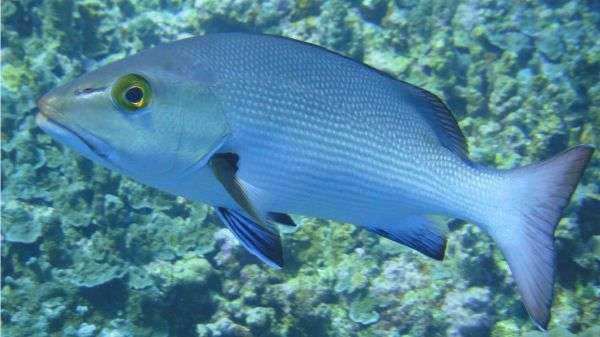Younger mangrove jacks weather climate change better than parents

WA research has revealed adult mangrove jack (Lutjanus argentimaculatus) are likely to be negatively impacted by climate change, but that juveniles may actually benefit from its effects.
Mangrove jack are a long-lived, recreationally-important species in WA's northwest which change habitat preferences as they grow, residing in mangroves and estuaries as juveniles and offshore reefs as adults.
UWA PhD student and lead author Joyce Ong says this study is the first to analyse growth chronologies of tropical fish at different life stages.
The research used a cross-dating technique to piece together growth chronologies from annual increments in the fish's otoliths (ear bones).
Annual growth bands are laid down in otoliths similar to growth rings in trees and the width of these bands reflects the growth of the fish itself.
By assigning the increments to a calendar year, the researchers related fish growth to data on environmental conditions such as sea surface temperature, salinity and rainfall.
"What we found was different responses in the adults, compared to the juveniles," Ms Ong says.
The 29-year period of growth developed for adult mangrove jack revealed correlations with the Niño-4 Index, an indicator of the El Niño Southern-Oscillation Index (ENSO), which signposts temperature changes in the Pacific Ocean.
"We found that in the years 1988/89 and 1999/00 there were much higher growth rates in the adults of mangrove jack and this correlates to strong La Niña years," Ms Ong says.
"In La Niña years there is an increase in the flow of warmer and lower salinity waters from the Western Pacific, through the Indonesian Flow Through and along the coast of Western Australia."
Ms Ong says conditions in strong La Niña years likely increase metabolic rates and food conversion efficiencies, and lower the metabolic costs of osmoregulation (water regulation) in these fish.
However, the frequency and severity of the opposite conditions, El Niño, is predicted to increase with climate change and reduce this flow of warmer and lower salinity water to northern WA.
In contrast to the adults, the time series developed for juveniles revealed their growth is likely to respond positively to increasing rainfall as a result of climate change.
"Studies have shown rainfall in the northwest of WA has been increasing since the 1970s," Ms Ong says.
She says if rainfall increases further it would be good news juveniles in estuaries.
More information: "Contrasting environmental drivers of adult and juvenile growth in a marine fish: implications for the effects of climate change." Sci Rep. 2015 Jun 8;5:10859. DOI: 10.1038/srep10859
Provided by Science Network WA





















